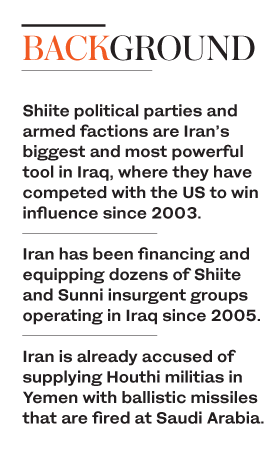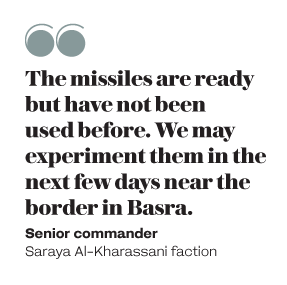BAGHDAD: Iraqi armed factions backed by Iran have been working for months to develop ballistic missiles and are threatening to use them against American forces in the country, Shiite commanders and Iraqi security officials told Arab News.
Improved missile technology being developed by Iranian proxy forces in another country in the Middle East will be of grave concern to Arab countries and the US.
Iran is already accused of supplying Houthi militias in Yemen with ballistic missiles that are fired at Saudi Arabia, and helping Hezbollah build factories in Lebanon that produce similar weapons.
Iran has been financing and equipping dozens of Shiite and Sunni insurgent groups operating in Iraq since 2005. Some have become the most powerful military groups in Iraq and the region, including Badr Organization, Assaib Ahl Al-Haq, Kattaib Hezbollah-Iraq and Saraya Al-Kharasani.
All of the groups fought against Daesh over the last four years under the umbrella of the Popular Mobilization, alongside the regular Iraqi military and which was backed by the US-led coalition in Iraq.
Latest versions
Although most of these groups have been equipped by Iran, many have established factories to manufacture they own weapons across the country.
They succeeded in producing some short-range missiles such as Al-Ashtar, Al-Muntaqim and Al-Qaher, and have moved on to expand the ranges of these missiles.
The most advanced — Al-Fatah — is the result two years work, a senior Shiite commander within the Saraya Al-Kharassani faction told Arab News.
He said the ranges of the latest versions are still unclear as they have not yet had a chance to test them.
“All the (Shiite) armed factions have participated in this by using Iraqi and foreign experts,” he said. “The missiles are ready but have not been used before. We may experiment them in the next few days near the border in Basra.”
A report by Reuters on Friday said ballistic missiles had been transferred from Iran to Iraq over the past few months to threaten Iran’s enemies in the region.
The report said the missiles had a range of between 200 and 700 kilometers, putting Riyadh or the Israeli city of Tel Aviv within striking distance if the weapons were deployed in southern or western Iraq.
Shiite commanders and Iraqi security officials, however, told Arab News that these missiles have been built in Iraq and their range has not yet been tested to be classified as medium-range. They said their use for targets outside Iraq has not even discussed.
 Ahmed Assadi, the commander of Kattaib Sayed Al-Shuhaddaa and a newly elected Shiite MP, told Arab News that so far the missiles had not yet reached further than 70 kilometers when tested.
Ahmed Assadi, the commander of Kattaib Sayed Al-Shuhaddaa and a newly elected Shiite MP, told Arab News that so far the missiles had not yet reached further than 70 kilometers when tested.
“There is a Directorate of Military Manufacturing linked to the popular mobilization that has factories spread outside the cities and in areas known to the government,” he said.
“We have been working on developing the range of missiles along the last four years and we started from the 6 kilometer range but have not succeeded to reach more than 70.”
Assadi denied that missiles were imported by either the regular security forces or the Shiite armed factions from Iran in the last few years.
The Kharassani commander claimed there was no possibility of using the new missiles against targets outside of Iraq but admitted that the government does not have control over the activities of the Iran-backed factions.
“All discussions until now indicate their use will be against the occupier inside Iraq,” he said, in reference to American forces in the country.
The number of missiles are few as the experts are waiting to test them soon in southern near the Iranian border.
“If the experiment of one (missile) succeeded, we can make ten in very short time,” the commander, said.
A senior Iraqi National Security official told Arab News that the transfer of ballistic missiles across the Iraq-Iran border would be almost impossible.
“The border is monitored by the US-led coalition forces by satellites, which are thermally sensitive to this type of missiles and thus it is impossible to transfer such missiles as one piece or even as disjointed pieces across the border without being monitored,” the official said.
“The issue is very serious and no country can get involved even Iran.”
Shiite political parties and armed factions are Iran’s biggest and most powerful tool in Iraq, where they have competed with the US to win influence since 2003.
“The Americans know that the ballistic Iranian missiles are in Lebanon with Hezbollah not in Iraq,” a prominent Shiite leader told Arab News.
 “Iraq is an area used by Iran to solve its problems with America not vice versa.
“Iraq is an area used by Iran to solve its problems with America not vice versa.
“Iran sees Iraq as a region that could lose its control completely at any moment, so why would they provide Iraqis with ballistic missiles that might be used against it one day?”
























